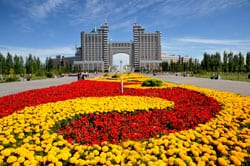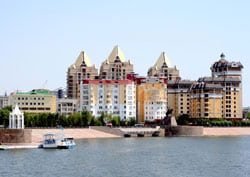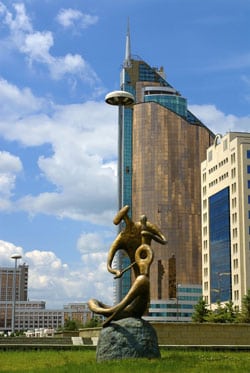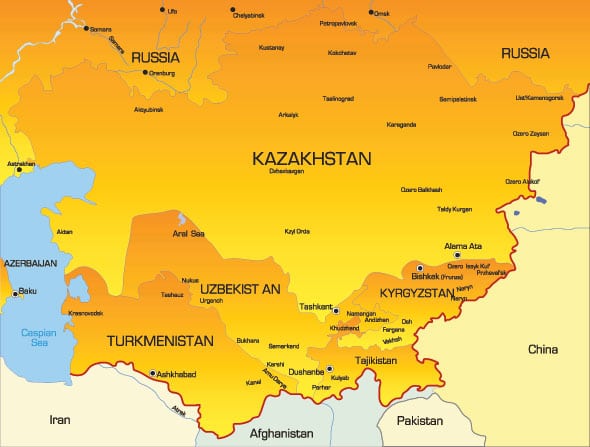Kazakhstan – The Sky’s the limit
 Kazakhstan is a land of near-mythical promise, brimming with its own vast mineral resources and blessed with natural bounty. The nation’s economy is already the largest in Central Asia, but as Kazakhstan develops, there are still plenty of diverse investment opportunities for the savvy entrepreneur.
Kazakhstan is a land of near-mythical promise, brimming with its own vast mineral resources and blessed with natural bounty. The nation’s economy is already the largest in Central Asia, but as Kazakhstan develops, there are still plenty of diverse investment opportunities for the savvy entrepreneur.
Perhaps the most evident example of this is Air Astana’s recent expansion. Flying the flag for Kazakhstan’s global ambitions, the airline set the business news wires alight when it ordered seven new Boeing aircraft, an order worth $1.3 billion. Air Astana has experience strong traffic growth on its Asian network. As a result, the airline is planning to boost frequencies on existing long haul scheduled services from Almaty to Bangkok, Delhi and Kuala Lumpur, as well as launch a new scheduled service to Hong Kong in early 2012 and initiate a winter season only service to Ho Chi Minch City, Vietnam in late 2012.
Currently the airline’s long-haul services will are operated by Boeing 757 / 767 aircraft, with the Business class cabin featuring lie-flat beds, but their new order with Boeing will see upgrades to a fleet of 767 and 787. The 787s will have the range for it to consider longer routes than it flies now, to points in the U.S., the Australia-New Zealand-New Guinea area and Africa.
Of course, Kazakhstan itself has taken great steps to modernise and integrate its economy with the global economic system, as Kazak President Nursultan Nazarbayev is at pains to point out.
“We are consistently moving towards the establishment of the Eurasian Economic Union,” he says. “It is crucial for Kazakhstan to be in the tideway of the key trends of the world’s development. Our foreign policy has never suffered from geopolitical naivety.”
There has been major foreign investment in the Caspian oil sector, bringing rapid economic growth.
The Eurasian Union is the brainchild of Vladimir Putin, widely expected to be rolled out during his third term as the President of Russia. It will enhance the continuing Customs Union between Belarus, Kazakhstan, and Russia which came into existence in 2010 with Kyrgyzstan, and Tajikistan joining the union.

“The Eurasian integration is a key factor of the regional stability, raising the competitive strength of the countries of the region and ensuring their technological breakthrough,” Nazarbayev explains. “Taking into account the country’s economy and politics in the 21st century we are moving to the economic union.”
Kazakhstan’s economy is expected to continue growing throughout 2012. According to international experts, the growth will be at the level of 6-6.5%. The accumulated safety margin and the government’s attention will determine macroeconomic stability. It is recommended to invest in technology-based projects for further growth.
In fact, improvements in communications are one of the main sectors in need of investment. The European Bank for Reconstruction and Development (EBRD) recently held a meeting in the capital, Astana. Top of the agenda was rationalising Kazakhstan’s rapidly developing economic infrastructures, beginning with the major cities of Astana and Alamty – the major commercial center of Kazakhstan. The wider objective was to facilitate a smoother economic development throughout the country.
To date, the EBRD has invested over US$5 billion in Kazakhstan – injecting $1 billion into the country’s economy during 2011. The EBRD also allocated $4 billion for investment projects, which have mobilized additional stream of investments into the Kazakh economy to an estimated total of 7 billion Euros.

"Considering the additional funds attracted from the EBRD partners, these investments hit $14 billion," Kazakh Finance Minister Bolat Zhamishev Zhamishev explains. He confirmed that $6.5 billion was invested in infrastructure projects; $3 billion in the banking industry ($400 million went to small and medium businesses); about $2 billion in the energy and mineral resources sectors; more than $2.5 billion in industry and agriculture. In total, Kazakhstan has attracted more than $122 billion in FDI since 1993.
While the long established economic orders of Western Europe and United States are still reeling from the financial storm of 2008, Kazakhstan has found itself in a far better position to enjoy the recovery. In fact, the nation has seen something of a boom in FDI inflows.
There has been major foreign investment in the Caspian oil sector, bringing rapid economic growth. By 2010, per capita gross domestic product was estimated to have grown more than tenfold since the mid-nineties.
An oil pipeline linking the Tengiz oil field in western Kazakhstan to the Russian Black Sea port of Novorossiysk opened in 2001. In 2008, Kazakhstan began pumping some oil exports through the Baku-Tbilisi-Ceyhan pipeline, as part of a drive to lessen its dependence on Russia as a transit country. A pipeline to China opened in late 2005. According to a report from the BBC, Kazakhstan is also the world’s largest producer of uranium.
 Kazakstan has shot up to 47th place among 183 economies in the World Bank’s "Ease of Doing Business" report for 2012 – from 59th place last year and 74th for 2010. Ernst & Young’s Investors Opinion Survey confirms considerable improvements in Kazakhstan’s investment climate. However, the report did suggest that corporate governance as well as the legal and regulatory environment had plenty of room for improvement, while also nodding at much needed improvements to infrastructure were needed, as we’ve already mentioned.
Kazakstan has shot up to 47th place among 183 economies in the World Bank’s "Ease of Doing Business" report for 2012 – from 59th place last year and 74th for 2010. Ernst & Young’s Investors Opinion Survey confirms considerable improvements in Kazakhstan’s investment climate. However, the report did suggest that corporate governance as well as the legal and regulatory environment had plenty of room for improvement, while also nodding at much needed improvements to infrastructure were needed, as we’ve already mentioned.
"Further industrial development is impossible without modernization and updating of the country’s enterprises," President Nazarbayev explained to the Council of Foreign Investors, also emphasising the need for better energy conservation efforts. "Energy efficiency is our next pain point – just the mining and smelting complex of the country consumes more than half of energy produced in the country."
Kazakhstan has ambitions to integrate into the wider global economic network – and they are not unrealistic. With its geographic location and mineral wealth, Kazakhstan can quite conceivably exert an impact on the global economy.
However, the need for development in inter-regional infrastructure in the areas of energy, trade and transit is palpable. With continued investment and improvements in governance, Kazakhstan is in a prime position to excel.



